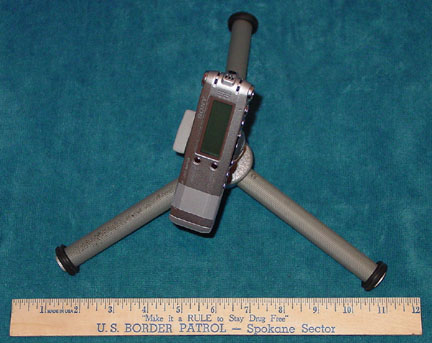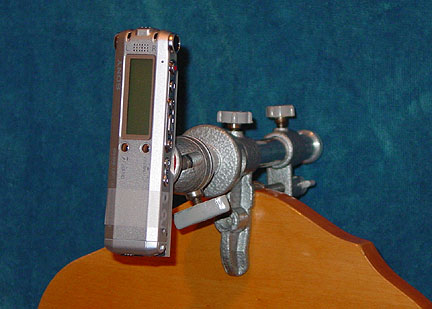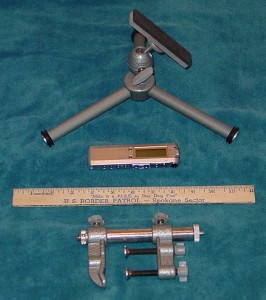 Mary Souza’s The City’s Pulse Newsletter dated July, 8, 2008, and titled Respect for All raised an issue about recording public meetings. Is it necessary for everyone at a public meeting to be notified that the meeting is being recorded? How do you feel about it?
Mary Souza’s The City’s Pulse Newsletter dated July, 8, 2008, and titled Respect for All raised an issue about recording public meetings. Is it necessary for everyone at a public meeting to be notified that the meeting is being recorded? How do you feel about it?
In the opinion of the Idaho Attorney General, a government agency’s audio tapes of a public meeting are public records. It is logical to infer from the opinion that it is lawful to make the audio recording in the first place. If it is lawful for the agency to record its public meeting, it follows that it is lawful for the public to also record it.
The Idaho Open Meeting Law does not explicitly state recording of public meetings is legal or illegal, however it does state in Idaho Code 67-2344 that “Neither a full transcript nor a recording of the meeting is required, except as otherwise provided by law.” That wording suggests recording is permissible though not required. The legislature would likely have explicitly forbidden the recording of public meetings if that was its intent.
But just because we are permitted to record a meeting, should we? That’s a more difficult question that each of us needs to decide.
“reagan” added a comment to Mary’s post and expressed his opinion that “recording … is also sneaky underhanded and duplicitous.” “reagan” is probably not alone in his or her opinion of recording public meetings. “reagan” would consider the officials’ recording of public meetings to be sneaky, underhanded, and duplicitous, “… if no notice was given, no notice was posted and it was not common knowledge that the recording of meetings was standard operating procedure and the intent was to record the meetings without the other party(s) knowing about the recording.”
Fair enough. But “reagan’s” terminology raises even more questions.
What constitutes “notice?” What constitutes “common knowledge that the recording of meetings was standard operating procedure?” How would one know what the intent of the recording was?
As I pointed out in another of the comments, prior to the City of Coeur d’Alene’s televising some public meetings on Cable Channel 19 and recording the meeting on DVD for rebroadcast, the City Clerk was using an audio casette recorder to record Council meetings. The recording supplemented the Clerk’s contemporaneous notes of the meeting. It became a public record and had to be preserved and eventually erased as provided by state law. Duplicates of the casette recordings were available to the public under the Idaho Public Records Law. I wonder how many people who spoke in front of the Council knew that … or cared. I doubt that too many people accused the City of being sneaky, underhanded, or duplicitous for making the casettes.
Audio recordings (including video with an audio track) are a very good record of what was said, by whom, and in what context at a public meeting. In fact, the recording is likely to be a more complete and accurate record than a recording secretary’s notes or even a legal stenographer’s verbatim transcript.
People sometimes associate audio recording with some clandestine, covert, or undercover law enforcement activity. In part, that association has resulted from the equipment getting smaller and less obvious. While some of today’s commercial-off-the-shelf (COTS) recording equipment can be easily concealed and could be used to make covert recordings, its design renders most COTS equipment primarily useful for overt rather than covert recording.
As as example, the photos below show the equipment I use to record public meetings.
The digital voice recorder, a Sony Model ICD-SX68, is positioned just above the 12-inch ruler in the photo. Photographers may recognize the Rowi table tripod and clampod, circa 1960. I fabricated the recorder mount shown on the tripod from aluminum strap and a piece of rubber cut from an old mouse pad. The recorder mounted on the tripod is shown below.

The rubber grommets on the tripod legs and the rubber on the aluminum strap help isolate the recorder’s internal microphones from vibrations when the assembly is on a table or desk. The recorder is fastened to the strap with cellophane tape or rubber bands. The recorder mounted on the clampod and thence to a chair back is shown below.

These are hardly covert or clandestine or even unnoticeable installations. They are out in the open where anyone can see them. In some meetings where tables, desks, or surfaces for clamping are not available, I simply hold the recorder up in my hand. Regardless of the mounting method, the objective is to give the recorder’s microphones an unobstructed audio path to the sound sources. Anything between the microphones and the source(s) attenuates the sound and may affect its quality. The idea of recording a public meeting is to get the best sound possible, not hide the recorder.
Writers use the recordings of public meetings to write more accurately, completely, and informatively. Conscientious writers do not want to do anything that will disrupt the meeting. The focus of everyone present should be on the conduct and content of the meeting, not the mechanism for recording it.
I hope public officials are willing to conduct their public meetings without doing anything to hinder or obstruct their lawful recording. To those public officials who might try to discourage the lawful recording of public meetings, the public will rightly ask, “What do you have to hide?”


There’s another issue here, that I believe is more solid. That’s personal accountability.
For me, the reason I record a conversation or meeting is because I want a record of what I have said. As happened to me in the past, especially on the blogs, people come out and claim, “Gookin said such-and-such, blah-blah-blah.” There is nothing to refute that, unless you have a recording of yourself that demonstrates someone is misrepresenting what happened.
Again, as I said in the other post, having a non-passionate electronic recording enables you to defend yourself in the face of a lie. Sure, you could use a recording to “get” or “corner” a public official. But they shoulder accountability that a citizen doesn’t, and if they’re out of line the public is entitled to know about it. As an individual, however, you have no defense against unscrupulous elected officials and their nearsighted apologists from unsubstantiated accusations — unless you have the ability to record your own interactions with those officials.
Comment by Dan — July 9, 2008 @ 2:25 pm
Dan,
Excellent point.
Record to protect yourself is one that even public officials should heed. A small part of my training in law enforcement included how to interact with the news media. The course was taught by a television news director. He said no public official should ever meet with the press without recording the interview. His reasons was exactly the same as yours: You may need to refute the content of a story with an editor or assignment editor, and your best evidence would be a good quality recording of the entire interview. A couple years ago I was interviewed for a story on Spokane Public Radio. The reporter, Doug Nadvornick, came to my office to do the interview. He was surprised that I was using exactly the same equipment he was to record the interview, but my recording the interview didn’t bother him a bit.
Comment by Bill — July 9, 2008 @ 3:25 pm
Wow – sounds like a case of paranoia to me. Are our public officials going to argue that they expect privacy at a public meeting now? This is just so Idaho. Looks like ‘their’ own methods are backfiring on them.
One of the first cases, if not the first case in Idaho concerning the recording of private phone conversations occurred in Bonner County at the hands of the Sheriff’s office. Scott Reed represented the Plaintiffs. It was eventually settled out of court. Nothing of any magnitude was reported in the papers back then about this case. Hoskins and Lamana took it to court after she found out from ME that there was an alledged murder plot. I knew because my ex husband told me. Bob Howard was his first cousin. That is the only way she could have found out. When I learned of the court case, I knew it was true – the recording of private phone conversations by a deputy sheriff. However, I was never allowed in that court case because during my divorce back then (about the same time) because my credibility was mutilated through expert witness’s that were bought. I contacted Scott Reed and told him of my knowledge and nothing was done. At that time my life was pure living hell. Sometimes, it still is.
I had a reasonable suspician that I was also being recorded, but you just don’t go around claiming that your phones are tapped unless you can prove it. Some folks might think that is a sign of mental illness. 😉
That case is right here – you can’t download it off of the judicial site any longer. You have to know about it. http://www.stebbijo.com/images/hoskins3.pdf I followed this case for five years.
Bob Howard is the Emergency Management Director of Bonner County and works closely with folks in Kootenai County. Some people know how to climb all the way to the top on their slimey bellies. Just an FYI.
Comment by Stebbijo — July 9, 2008 @ 3:46 pm
Why would it bother ANY honest person?
Comment by Pariah — July 9, 2008 @ 4:33 pm
Pariah,
I completely understand why honest people might be bothered about a public meeting being recorded. Most honest people don’t really care about having their honest comments recorded — but they do care about someone misusing or misinterpreting the recording. What the honest people are really questioning is the motivation of the person making the recordings. What is he going to do with the recording?
Here in Coeur d’Alene employers have been approached by public officials and “encouraged” to stifle employees who speak out publicly. It isn’t any wonder that someone seeing me or anyone they don’t know and trust with a recorder might wonder, “If I speak up here at this meeting, will this yo-yo with the recorder go to my boss and get me fired?” That’s the culture of intimidation that has been instilled here.
Comment by Bill — July 9, 2008 @ 7:25 pm
I get that POV Bill, in an academic way. In the real world, truth has a way of protecting honest people.
Comment by Pariah — July 9, 2008 @ 7:44 pm
Pariah,
I wish that in the real world, truth always protected honest people. If it did, the criminal justice system would have no problems with witness intimidation. The problem of economic intimidation here in Coeur d’Alene is real, not academic. It will be overcome when employers refuse to succumb to direct or veiled threats from public officials and when those same employers have the courage to stand up for their employees and help them expose the attempts to the public.
Comment by Bill — July 9, 2008 @ 8:10 pm